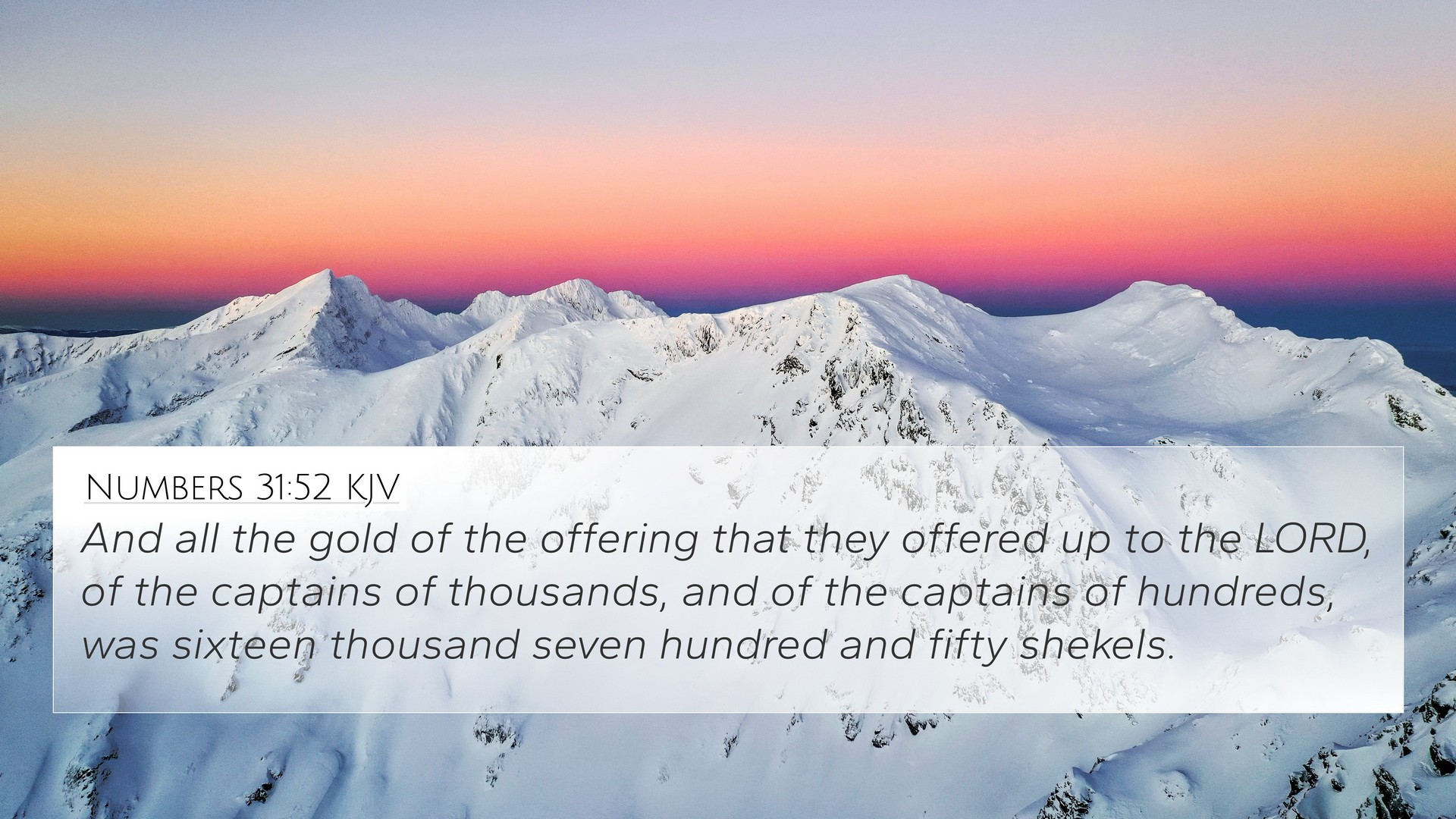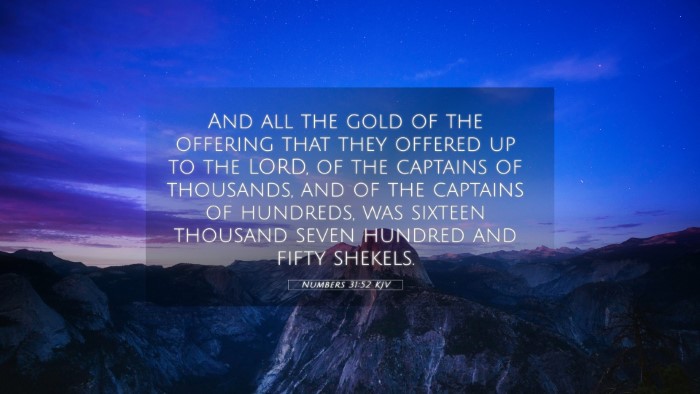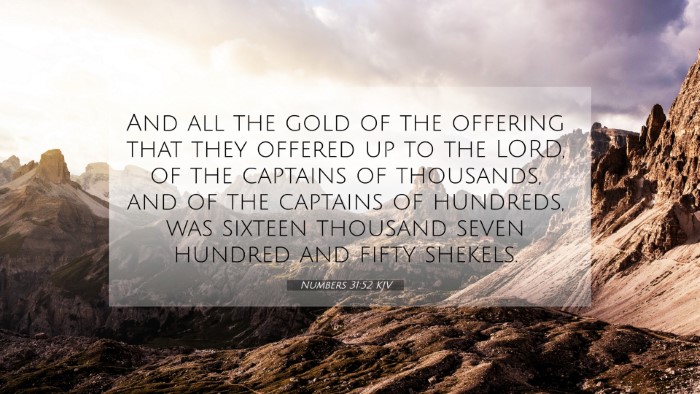Understanding Numbers 31:52
Verse: Numbers 31:52 - "And all the gold of the offering that they offered to the Lord, of the captains of thousands, and of the captains of hundreds, was sixteen thousand seven hundred and fifty shekels."
Summary of Interpretation
This verse records the total amount of gold collected from the military leaders as an offering to the Lord after a significant victory. It reflects not only a material contribution but also a spiritual acknowledgment of God's guidance and blessings in their military endeavors.
Insights from Public Domain Commentaries
Various commentaries provide rich insights into the meaning of this verse:
- Matthew Henry: He emphasizes that the offering was a way to honor God, demonstrating gratitude for His providence in their success. This act of giving material wealth is symbolic of their recognition of God's ownership and their dependence on Him.
- Albert Barnes: Barnes notes that the offering reflects a significant commitment from the leaders. The gold amount signifies the prosperity of Israel after defeating their enemies, and such contributions serve as a reminder of the importance of dedicating the spoils of victory to God.
- Adam Clarke: Clarke highlights that the specificity of the amount is important, indicating careful accounting and a serious approach to honoring God. This reflects an organized and thoughtful worship practice among the people of Israel.
Bible Verse Cross-References
This verse interlinks with various other biblical passages, enhancing its meaning through cross-references:
- Exodus 30:13: Discusses the shekel as a unit of measure and the practice of offering to God, linking the value placed on offerings.
- Numbers 18:12: Mentions the dedicated offerings of the Israelites, for the priests, showcasing the thematic importance of offerings throughout the Torah.
- 1 Chronicles 29:6-9: Relates to the offerings made for the temple, emphasizing the principle of generous giving toward God’s work.
- Deuteronomy 26:1-2: Talks about bringing the first fruits of the land as an offering, showing the importance of dedication and sacrifice.
- 2 Corinthians 9:7: New Testament perspective on giving, emphasizing cheerful giving, reflecting a heart attitude in offerings.
- Matthew 6:21: "For where your treasure is, there your heart will be also," symbolizing the connection of wealth and devotion to God.
- Romans 12:1: Calls for presenting our bodies as living sacrifices, which can be seen as an extension of the principles of dedicating resources to God.
- Philippians 4:18: Discusses the gifts sent to Paul as a fragrant offering, linking the New Testament understanding of contributions to God’s work.
- James 1:17: "Every good gift and every perfect gift is from above," reiterating that all riches and provisions are ultimately from God.
- Acts 20:35: Reminds us of the blessedness of giving, aligning with the spirit of offerings found throughout Scripture.
Thematic Bible Verse Connections
This verse aligns with diverse themes within Scripture, such as:
- The principle of returning a portion of one's blessings back to God.
- Understanding that material wealth should be viewed in the context of spiritual responsibility.
- The call for communal participation in worship through offerings.
- The acknowledgment that victories in life (spiritual and physical) are gifts from God that require thanksgiving.
- The pattern of accountability and careful stewardship observed in biblical giving.
Comparative Bible Verse Analysis
Analyzing this verse in conjunction with others allows for deeper understanding:
- Comparison with the sacrificial system in Leviticus reveals a historical pattern of giving.
- Exploring the differences in offering practices between the Old and New Testament.
- Linking David's preparation for the temple offerings in 1 Chronicles presents a continuance of the principle established here.
- Connecting the concept of gifts and offerings to Christ's teaching on giving emphasizes the evolution of how offerings are perceived in the New Covenant.
Essential Tools for Bible Cross-Referencing
For deeper studies, utilizing various tools can enhance understanding:
- Bible Concordance: Useful for finding related verses quickly.
- Bible Cross-Reference Guide: A structured approach to seeing connections between scriptures.
- Cross-Reference Bible Study: A methodical way to explore themes and concepts throughout the Bible.
- Bible Reference Resources: Access to comprehensive materials for deeper understanding and context.
- Tools for Identifying Connections: Resources that facilitate the discovery of inter-biblical dialogue and themes.
User Intent Keywords
This verse provokes various questions about its connections:
- What verses are related to Numbers 31:52?
- Find cross-references for this specific verse to deepen understanding.
- How do Numbers 31:52 and Exodus 30:13 connect?
- Similarities between Numbers 31:52 and New Testament teachings on offerings.
- Bible verses that support the principles found in Numbers 31:52.
Conclusion
Numbers 31:52 provides a rich foundation for understanding the spiritual significance of offerings among the Israelites, reflecting a broader biblical theme of gratitude, worship, and the recognition of God's provision. Through various commentaries and cross-referencing other related scriptures, we gain a comprehensive view of its implications in both the Old and New Testaments.


